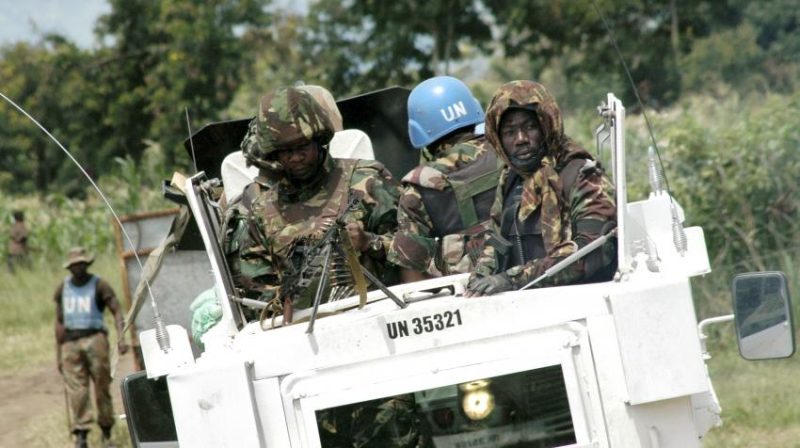The Government of the Democratic Republic of the Congo (DRC) and the United Nations Organization Stabilization Mission in the DRC (MONUSCO) have signed a note on the accelerated, gradual, orderly and responsible withdrawal of the peacekeeping mission from the country. The note, co-signed by the Congolese Vice Prime Minister, Minister of Foreign Affairs and Francophonie, Mr Christophe Lutundula, and the Special Representative of the UN Secretary-General in the DRC and Head of MONUSCO, Ms Bintou Keita, on 21 November in Kinshasa, contains a plan and a timeline for the complete disengagement of the mission in the country.
The signing of the note follows the request of the Congolese Head of State, H.E. Mr Félix Antoine Tshisekedi Tshilombo, and his Vice Prime Minister, Mr Christophe Lutundula, to accelerate the withdrawal of MONUSCO from the DRC starting in December 2023, which they expressed last September at the UN General Assembly. The Security Council, in its Presidential Statement of 16 October, welcomed the request and urged the parties to develop a joint disengagement plan.
The plan, which was developed by joint technical teams bringing together Government and MONUSCO counterparts, will be jointly implemented in three phases, with the support of the DRC’s international and national partners. The plan envisages a progressive reduction of MONUSCO’s military and civilian presence, as well as a transfer of tasks and responsibilities from MONUSCO to the Government of the DRC. The plan also foresees a quarterly evaluation mechanism to enable regular stocktaking of the situation and minimise any sudden disruptions that could lead to a security vacuum.
“We want this withdrawal to be a model that will give us greater international respectability and help us improve our country’s image. This document contains a plan for the disengagement of the MONUSCO Force and a plan for transferring tasks and responsibilities from MONUSCO to the Government of the DRC. We also foresee a quarterly evaluation mechanism to enable regular stocktaking of the situation and minimise any sudden disruptions that could lead to a security vacuum,” Mr Christophe Lutundula said.
MONUSCO Head Bintou Keita said the mission worked with Congolese authorities toward “accelerated” withdrawal in “a spirit of collaboration and mutual respect”.
“We thank our Congolese partners for signing this disengagement plan, which marks the end of a long process. We remain determined to work with the Congolese authorities towards an accelerated withdrawal of MONUSCO that consolidates the gains made during the Mission’s presence in the DRC. We have worked together in a constructive spirit of collaboration and mutual respect to achieve this objective set by the Security Council,” the Head of MONUSCO, Ms Bintou Keita, declared.
After the Mission’s departure, the UN system will continue to support the development efforts of the Congolese Government and people, to sustain peacebuilding and security gains in the country.
The withdrawal process is expected to begin on 1 January 2024. MONUSCO is a UN peacekeeping force in the DRC which was established in 2010. It aims to ensure security and stability in the country and to support the rule of law and human rights. MONUSCO came into being on 1 July 2010 in the wake of the closure of MONUC (UN Organization Mission in the DRC) and became the first authorised to use “all necessary means”, including force, to carry out its mandate. This authorisation saw the establishment of the Force Intervention Brigade (FIB), staffed by three Southern African Development Community (SADC) countries – Malawi, Tanzania and South Africa. All three number in the top 10 troop-contributing countries (TCCs) with India, Pakistan, Bangladesh, Nepal, Indonesia, Morocco and Uruguay.
The phased withdrawal process is reported to be in three stages; the first stage is already at an advanced level and will lead to the complete withdrawal of MONUSCO military and police personnel from South Kivu by 30 April 2024. The withdrawal will see 14 MONUSCO bases handed to the DRC government. The second is the withdrawal from North Kivu during the second half of next year. This will follow “a full evaluation” of the first phase and will see “sequential withdrawal of forces from the central sector to ensure MONUSCO protection tasks can be carried out in Goma while the disengagement process is underway”. The Kivu withdrawal will see a further 22 MONUSCO bases handed to DRC government authorities. The third phase, according to the mission, will start post-phase two evaluation and see MONUSCO exit the Ituri province.
In April, South Sudanese soldiers arrived in Goma, in the east of the Democratic Republic of Congo, after South Sudanese President Salva Kiir announced that his country had sent a battalion of 750 soldiers to DR Congo under the East African Regional Force (EARF) tasked to restore peace in the country’s restive east,
South Africa’s commitment to MONUSCO comprises a battalion component of the Force Intervention Brigade (FIB), a quick reaction force (QRF), an intelligence unit and the combined helicopter unit (CHU) manned with Oryx and Rooivalk as well as a level two SA Military Health Service (SAMHS) facility in Goma.
Meanwhile, the East African Community (EAC) peacekeeping force will end its mission in the eastern Democratic Republic of Congo (DRC) after December 8, according to a statement issued by the regional bloc’s heads of state. The EAC Regional Force (EACRF) has been deployed in the conflict-ridden region since 2022 but has failed to bring lasting stability and security to the area. The EAC leaders said they will hand over the responsibility to the Southern African Development Community (SADC) forces, but will remain engaged in the peace process.
